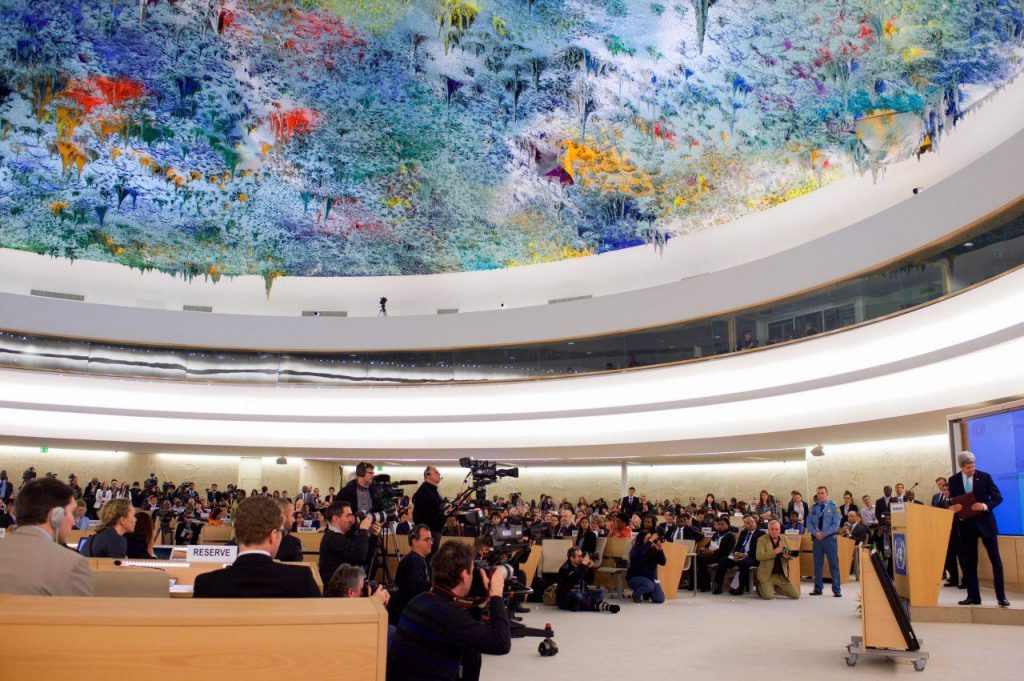The Human Rights Council this afternoon held a clustered interactive dialogue with Dubravka Šimonović, Special Rapporteur on violence against women, its causes and consequences, and Maria Grazia Giammarinaro, Special Rapporteur on trafficking in persons, especially women and children.
Ms. Šimonović said that her thematic report analysed 25 years of the mandate, the current challenges, and the way forward. The global context of women’s rights was marked by a rise in various women’s movements across the world which called for an end to gender-based violence against women and girls. At the same time, she said, there was a mounting backlash against women’s rights and a rise in retrogressive movements, confirming the endemic and widespread nature of violence against women and its normalization in all areas of public and private lives. The momentum linked to the upcoming Beijing+25 review and the five-year review of the Sustainable Development Goal 5 must be used to develop a new global system-wide approach to eliminate violence against women and girls and bridge implementation gaps between international and national policy levels, she said, before introducing reports on her visits to Canada and Nepal.
Ms. Giammarinaro stressed the importance of innovative and transformative models of social inclusion of victims and survivors of trafficking in persons and related challenges, and noted that the idea of having been trafficked was not an irreversible condition. The social inclusion of victims of trafficking was not solely the responsibility of civil society; it was deeply rooted in the human rights obligations of States, particularly due diligence standards and the right to an effective remedy for people subjected to human rights violations. Combatting stigma associated with trafficking had been identified as one of the major challenges across all continents, she said, and underlined the importance of the economic empowerment of survivors, which was paramount to their psychological well-being: it increased self-esteem and self-fulfilment, contributing to social recognition and inclusion. The Special Rapporteur then presented the report on her visit to Nigeria.
Canada, Nepal and Nigeria spoke as concerned countries. The Canadian Human Rights Commission addressed the Council in a video message.
In the ensuing interactive dialogue on violence against women and girls, many speakers noted the mounting opposition against women’s rights that was getting stronger by the day, and shared the concern about this global backlash against feminism, gender equality, and women’s and girls’ rights and empowerment, which contributed to an increase in gender-based violence against women and girls. Today, as many as 70 per cent of women worldwide had experienced violence in their lifetime, while 200 million women and girls had undergone some form of female genital mutilation or cutting; in the majority of cases, girls were cut before the age of five. This showed the necessity for future measures and efforts, speakers said, and welcomed the Special Rapporteur’s proposals that aimed to bridge the gap between the mechanisms with specific focus on violence against women to avoid fragmentation.
In the discussion on trafficking in persons, it was noted that modern slavery was one of the gravest criminal offences, with over 40 million victims and profits of $32 billion annually. The common fight must be accelerated to tackle not only the symptoms but the underlying causes such as lack of opportunities, abject poverty, or conflicts. There was strong support for the recommendations that called on States to ensure that victims of trafficking received comprehensive and long-term protection and support to enable them to integrate into society and lead fulfilling lives with dignity and respect. States should adopt a holistic strategy for the social inclusion of victims of trafficking, while international cooperation in crafting responses to multidimensional crises that many countries were dealing with at their borders, was of paramount importance.
Speaking in the discussion were the following States: European Union; Finland (on behalf of a group of countries); Uruguay (on behalf of a group of countries); Angola (on behalf of the African Group); Rwanda (on behalf of a group of countries); Russian Federation; UN-Women; Pakistan; Togo; Libya; Holy See; Liechtenstein; Australia; State of Palestine; Tunisia; Belarus; India; Lithuania; Croatia; United Arab Emirates; Burkina Faso; Israel; Uruguay; Algeria; Cuba; Italy; Thailand; Montenegro; Paraguay; Spain; Bahrain; Venezuela; Germany; Egypt; Sovereign Order of Malta.
Brazil spoke in right of reply.
The Human Rights Council will next meet at 9 a.m. on Friday, 28 June, when it will hold the second part of its annual full-day discussion on women’s rights, during which it will address the rights of older women and their economic empowerment. It will then conclude the interactive discussion on violence against women and on trafficking in persons, and start the interactive dialogue with the Special Rapporteurs on extreme poverty and on internally displaced persons.
Clustered Interactive Dialogue with the Special Rapporteurs on Violence against Women, its Causes and Consequences, and on Trafficking in Persons, Especially Women and Children
Documentation
The Council has before it the Report of the Special Rapporteur on violence against women, its causes and consequences (A/HRC/41/42). (**Advance version **A/HRC/41/42).
The Council has before it an addendum **to the **Report of the Special Rapporteur on violence against women, its causes and consequences – visit to Canada **(A/HRC/41/42/Add.1). (Advance version **A/HRC/41/42/Add.1)
The Council has before it an addendum **to the **Report of the Special Rapporteur on violence against women, its causes and consequences – visit to Nepal **(A/HRC/41/42/Add.2). (Advance version **A/HRC/41/42/Add.2)
The Council has before it an addendum **to the **Report of the Special Rapporteur on violence against women, its causes and consequences – comments by Canada **(A/HRC/41/42/Add.3). (Advance version **A/HRC/41/42/Add.3)
The Council has before it the Report of the Special Rapporteur on trafficking in persons, especially women and children (A/HRC/41/46).
The Council has before it an addendum **to the **Report of the Special Rapporteur on trafficking in persons, especially women and children – visit to Nigeria (A/HRC/41/46/Add.1).
Presentation of Reports
DUBRAVKA ŠIMONOVIĆ, Special Rapporteur on violence against women, its causes and consequences, said that her thematic report analysed 25 years of the mandate, the current challenges, and the way forward. When the mandate had been established in 1994, violence against women had not been recognized as a human rights violation; today at the normative level, it was recognized as a human rights violation and a form of discrimination against women. The global context of women’s rights was marked by a rise in various women’s movements, such as #MeToo, #Ni Una Menos, and Break the Silence, and their various manifestations across the world, which called for an end to gender-based violence against women and girls. At the same time, the Special Rapporteur said, they were witnessing a mounting backlash against women’s rights and a rise in retrogressive movements, both confirming the endemic and widespread nature of violence against women and its normalization in all areas of public and private lives.
The report outlined the shortcomings and fragmentation of the current system and called for the development of a system-wide approach to eliminate violence against women, including through the institutionalization of the platform of international and regional independent mechanisms on women’s rights and violence against women, set up in 2017, and which had to date issued joint statements on several issues, including on the current pushback against women’s rights and on intimate partner violence against women as an essential factor in the determination of child custody. Ms. Šimonović emphasized that the momentum linked to the upcoming Beijing+25 review and the five-year review of the Sustainable Development Goal 5 must be used to develop a new global system-wide approach to eliminate violence against women and girls and bridge implementation gaps between international and national policy levels.
Turning to country reports, the Special Rapporteur commended an array of policy initiatives on violence against women at various levels of the Canadian Government, some of which represented good practices that could be replicated at the global level; she also raised concern about different levels of protection of women’s rights and protection gaps across the territory, and was particularly worried about the situation of indigenous women. In Nepal, Ms. Šimonović noted that regardless of the protection from violence against women in the Constitution, eliminating violence against women and girls and attaining gender equality remained elusive, due to patriarchal social norms and discriminatory harmful practices such as child marriage, witchcraft, and others. Of particular concern were violence against Dalit women and impunity for sexual violence against women and girls.
MARIA GRAZIA GIAMMARINARO, Special Rapporteur on trafficking in persons, especially women and children, stressing the importance of innovative and transformative models of social inclusion of victims and survivors of trafficking in persons and related challenges, said the idea of having been trafficked was not an irreversible condition. As it could be overcome, the label of “victim of trafficking” should be permanently removed. Social inclusion of victims of trafficking was not solely the responsibility of civil society; it was deeply rooted in the human rights obligations of States, particularly due diligence standards and the right to an effective remedy for people subjected to human rights violations. Combatting stigma associated with trafficking had been identified as one of the major challenges across all continents. It was extremely concerning that many countries had not yet implemented the international principle of non-punishment of trafficked persons for their involvement in unlawful activities to the extent that such involvement was a direct consequence of their situation as trafficked persons. Criminal records should be cleared to ensure that survivors could take back control of their lives.
Trafficked persons, whether returned to their country of origin or integrated into transit or destination countries, should feel safe to live an independent life. Access to long-term medical services and affordable accommodation was also essential for the physical and mental well-being of trafficked persons. For survivors, economic empowerment was paramount to their psychological well-being: it increased self-esteem and self-fulfilment, contributing to social recognition and inclusion. Civil society organizations had proven particularly creative in ensuring survivors’ economic empowerment. The private sector also had an important role to play in facilitating their integration.
Turning to her visit to Nigeria, the Special Rapporteur thanked the Government for its cooperation, and pointed out the remaining challenges. The prevention of trafficking in persons had been identified as one of the main priorities; the reintegration and rehabilitation of trafficked person had proven challenging, especially following returns from Libya and other countries; and civil society organizations had identified corruption, lack of confidence in the judicial system, and lack of training and specialized knowledge amongst law enforcement officials and members of the judiciary, inter alia, as issues of concern.
Statements by Concerned Countries
Canada, speaking as a concerned country, said it welcomed the Special Rapporteur’s recommendations, which it was carefully reviewing. Canada continued to invest in important initiatives and had taken steps that were reflected in many of the recommendations. New initiatives, like those in Canada’s National Housing Strategy, would help create or repair at least 7,000 shelter spaces for those fleeing family violence. In 2016, the Government had launched the National Inquiry into Missing and Murdered Indigenous Women and Girls. Since its launch, Canada had taken steps to address early recommendations, including with respect to health support and victim services support, and establishing a commemoration fund. Canada welcomed the Inquiry’s final report earlier this month, the recommendations of which it was thoroughly reviewing. It would continue to work with indigenous partners in Canada to determine next steps and indigenous-led action that included the perspectives and full participation of indigenous women, girls, and lesbian, gay, bisexual, transgender, queer and two-spirit people. Canada remained committed to opening up its human rights performance to international scrutiny.
Canadian Human Rights Commission, in a video message, commended the National Inquiry into Missing and Murdered Indigenous Women and Girls for taking a broad human and indigenous rights-based approach to the causes and consequences of violence and discrimination against women and girls in the country. It expressed support for, and endorsed, the 231 Calls to Justice contained in the report. Many of the changes proposed would make Canadian society more just, not just for indigenous women and girls. Expressing optimism that Canada would take the recommendations made by the Special Rapporteur seriously and act on them, the Canadian Human Rights Commission assured that it would do its part and encourage everyone in Canada to do the same.
Nepal, speaking as a concerned country, said it appreciated the Special Rapporteur’s constructive engagement in the country, and took positive note of the important observations and recommendations that she had made. Nepal was party to all major international human rights instruments and had been sincerely implementing them. As a member of the Human Rights Council, Nepal’s commitment to the promotion and protection of all human rights was total and unwavering. As per the Constitution of Nepal, no woman shall be subjected to any form of violence or exploitation on any ground whatsoever; any such acts were punishable and the victim had the right to obtain compensation in accordance with the law. The empowerment of women was critical for promoting gender equality and effectively addressing violence against women. The Government had taken measures to eradicate all kinds of harmful practices. Intersectional issues of discrimination and violence based on vulnerabilities of various sections of society were also well addressed within the ambit of legal protection. Challenges related to violence against women in Nepal could and would be addressed. Nepal attached importance to the insights and expertise of the Special Rapporteur.
Nigeria, speaking as a concerned country, expressed its appreciation for the Special Rapporteur’s visit in 2018. Nigeria welcomed the report, which it considered to be comprehensive and reasonably balanced, and was committed to the legal and institutional frameworks to alleviate the suffering of the most vulnerable groups, particularly women, girls and children. The Government had never relented in its efforts to combat trafficking in persons. It had been collaborating with the global community towards ensuring that this menace was appropriately addressed and would continue to do so. Acknowledging the challenges posed by the negative perception and stigmatization of some victims of human trafficking, as mentioned by the Special Rapporteur, Nigeria reiterated its commitment to ensuring that its counter-trafficking operations were in tandem with its international and domestic human rights obligations, and said it would work in synergy with the global community to appropriately address and nip in the bud the menace of human trafficking.
Interactive Dialogue
In the ensuing dialogue on violence against women and girls, many speakers noted the mounting opposition against women’s rights that was getting stronger by the day, and shared the concern about this global backlash against feminism, gender equality, and women’s and girls’ rights and empowerment, which contributed to an increase in gender-based violence against women and girls. A speaker noted that extreme structural and institutionalized forms of gender inequality and targeted violence against women might constitute potential risk factors for mass atrocities, and in this context emphasized the importance of the links between the women, peace, and security agenda and the responsibility to protect.
Most delegations appreciated the focus in the report on the mandate’s challenges, which were also evident in the fact that today, as many as 70 per cent of women worldwide had experienced violence in their lifetime, while 200 million women and girls had undergone some form of female genital mutilation or cutting; in the majority of cases, girls were cut before the age of five. Those figures showed the necessity for future measures and efforts, they said, and supported the Special Rapporteur’s proposals that aimed to bridge the gap between the mechanisms with specific focus on violence against women to avoid fragmentation.
The Special Rapporteur was asked to provide concrete advice on how coordination between relevant United Nations actors and their cooperation with the monitoring mechanisms provided by regional instruments could be further enhanced, and to explain what could be done, in the context of Beijing+25, to highlight the links and interdependence between discrimination and violence against women.
In the discussion on trafficking in persons, a speaker stressed that modern slavery was one of the gravest criminal offences; it had over 40 million victims and generated a profit of $32 billion annually, and it effects were disastrous. The common fight must be accelerated to tackle not only the symptoms but the underlying causes such as lack of opportunities, abject poverty, or conflicts. There was strong support for the Special Rapporteur’s recommendations that called on States to ensure that victims of trafficking received comprehensive and long-term protection and support to enable them to integrate into society and lead fulfilling lives with dignity and respect. The social inclusion of the trafficked persons was not only about their empowerment but about their acceptance by families and society as a whole; in this process, enhancing their economic independence played a key role. States, therefore, should adopt a holistic strategy for the social inclusion of victims of trafficking. A speaker stressed the paramount importance of international cooperation in crafting responses to multi-dimensional crises that many countries were dealing with at their borders.
A number of questions were asked during the debate, including how to strengthen synergies between regional initiatives to fight human trafficking and international human rights mechanisms, and about best practices for adoption by States of viable long-term measures aimed at social inclusion when designing anti-trafficking policies.
Interim Remarks:
DUBRAVKA ŠIMONOVIĆ, Special Rapporteur on violence against women, its causes and consequences, expressed appreciation for the steps that Canada and Nepal had taken to implement her recommendations, and especially their referencing of other mechanisms for the elimination of violence against women, such as the Convention on the Elimination of All Forms of Discrimination against Women. It was exactly the kind of synergies that the Special Rapporteur was trying to emphasize, because different international human rights instruments were providing different layers of recommendations which were then to be implemented at the national levels. It was important to note that there were still States that had not ratified those international and regional human rights instruments, and this was a task that must be soon completed in order to close protection gaps in countries.
MARIA GRAZIA GIAMMARINARO, Special Rapporteur on trafficking in persons, especially women and children, on the question raised about good practices in the private sector, noted the example of Polaris which had entered into corporate partnerships with a number of companies in different sectors. In Ethiopia, a number of companies were cooperating with the International Organization for Migration, in the context of the mass-return of migrants, in order to create employment for some of the 200,000 returnees. As for the role of the private sector in their voluntary social compliance initiatives, the focus so far was on victim identification and detection in the supply chain and not so much on the destiny of the exploited workers, the Special Rapporteur said. The right to effective remedy to victims of crimes, including victims of trafficking, was a part of the human rights obligations of States, to the maximum of available resources. Long-term social inclusion of trafficked persons should be prioritised, especially when victim compensation was not possible.
Source: Relief Web





Comments are closed.